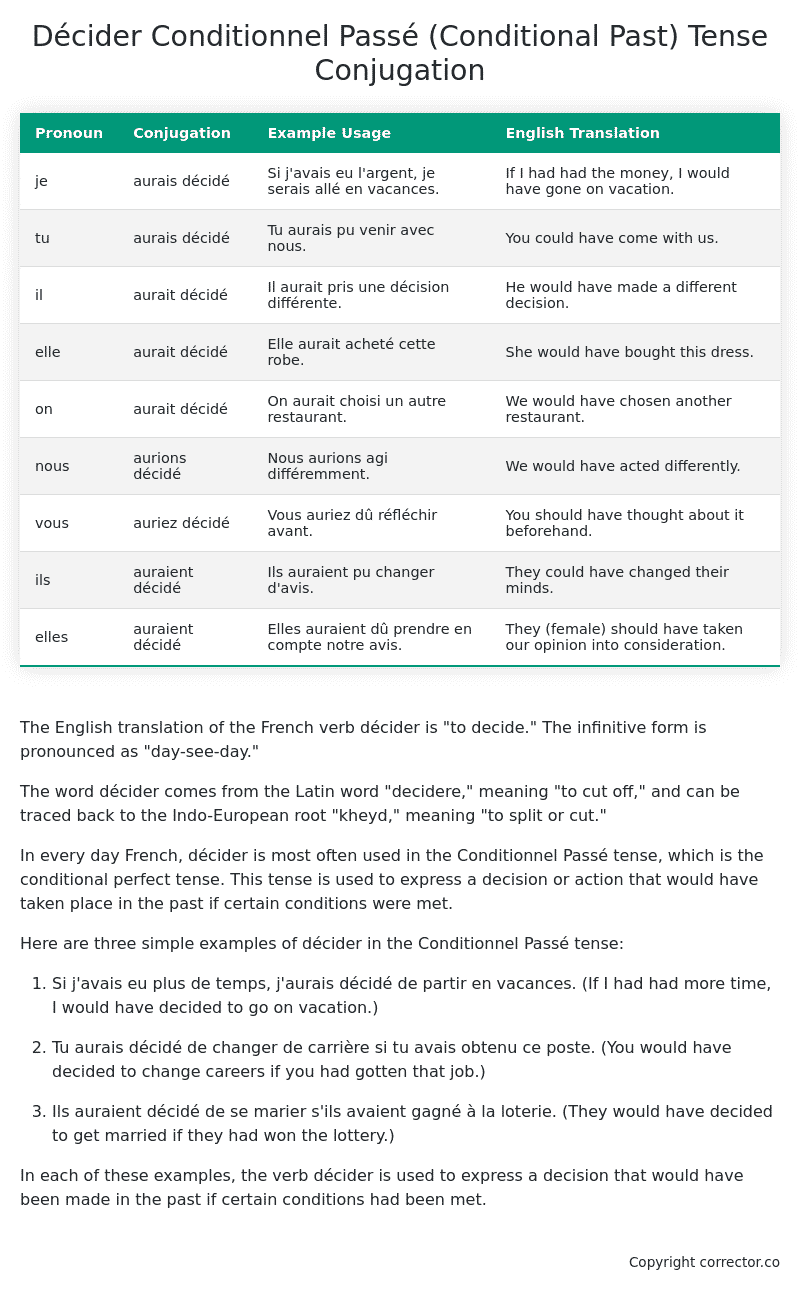Conditionnel Passé (Conditional Past) Tense Conjugation of the French Verb décider
Introduction to the verb décider
The English translation of the French verb décider is “to decide.” The infinitive form is pronounced as “day-see-day.”
The word décider comes from the Latin word “decidere,” meaning “to cut off,” and can be traced back to the Indo-European root “kheyd,” meaning “to split or cut.”
In every day French, décider is most often used in the Conditionnel Passé tense, which is the conditional perfect tense. This tense is used to express a decision or action that would have taken place in the past if certain conditions were met.
Here are three simple examples of décider in the Conditionnel Passé tense:
-
Si j’avais eu plus de temps, j’aurais décidé de partir en vacances. (If I had had more time, I would have decided to go on vacation.)
-
Tu aurais décidé de changer de carrière si tu avais obtenu ce poste. (You would have decided to change careers if you had gotten that job.)
-
Ils auraient décidé de se marier s’ils avaient gagné à la loterie. (They would have decided to get married if they had won the lottery.)
In each of these examples, the verb décider is used to express a decision that would have been made in the past if certain conditions had been met.
Table of the Conditionnel Passé (Conditional Past) Tense Conjugation of décider
| Pronoun | Conjugation | Example Usage | English Translation |
|---|---|---|---|
| je | aurais décidé | Si j’avais eu l’argent, je serais allé en vacances. | If I had had the money, I would have gone on vacation. |
| tu | aurais décidé | Tu aurais pu venir avec nous. | You could have come with us. |
| il | aurait décidé | Il aurait pris une décision différente. | He would have made a different decision. |
| elle | aurait décidé | Elle aurait acheté cette robe. | She would have bought this dress. |
| on | aurait décidé | On aurait choisi un autre restaurant. | We would have chosen another restaurant. |
| nous | aurions décidé | Nous aurions agi différemment. | We would have acted differently. |
| vous | auriez décidé | Vous auriez dû réfléchir avant. | You should have thought about it beforehand. |
| ils | auraient décidé | Ils auraient pu changer d’avis. | They could have changed their minds. |
| elles | auraient décidé | Elles auraient dû prendre en compte notre avis. | They (female) should have taken our opinion into consideration. |
Other Conjugations for Décider.
Le Present (Present Tense) Conjugation of the French Verb décider
Imparfait (Imperfect) Tense Conjugation of the French Verb décider
Passé Simple (Simple Past) Tense Conjugation of the French Verb décider
Passé Composé (Present Perfect) Tense Conjugation of the French Verb décider
Futur Simple (Simple Future) Tense Conjugation of the French Verb décider
Futur Proche (Near Future) Tense Conjugation of the French Verb décider
Plus-que-parfait (Pluperfect) Tense Conjugation of the French Verb décider
Passé Antérieur (Past Anterior) Tense Conjugation of the French Verb décider
Futur Antérieur (Future Anterior) Tense Conjugation of the French Verb décider
Subjonctif Présent (Subjunctive Present) Tense Conjugation of the French Verb décider
Subjonctif Passé (Subjunctive Past) Tense Conjugation of the French Verb décider
Subjonctif Imparfait (Subjunctive Imperfect) Tense Conjugation of the French Verb décider
Subjonctif Plus-que-parfait (Subjunctive Pluperfect) Tense Conjugation of the French Verb décider
Conditionnel Présent (Conditional Present) Tense Conjugation of the French Verb décider
Conditionnel Passé (Conditional Past) Tense Conjugation of the French Verb décider (this article)
L’impératif Présent (Imperative Present) Tense Conjugation of the French Verb décider
L’infinitif Présent (Infinitive Present) Tense Conjugation of the French Verb décider
Struggling with French verbs or the language in general? Why not use our free French Grammar Checker – no registration required!
Get a FREE Download Study Sheet of this Conjugation 🔥
Simply right click the image below, click “save image” and get your free reference for the décider Conditionnel Passé tense conjugation!

Décider – About the French Conditionnel Passé (Conditional Past) Tense
Formation
Common Everyday Usage Patterns
Expressing Unreal Past Scenarios
Polite Requests or Suggestions
Expressing Doubt or Uncertainty
Interactions with Other Tenses
Conditional Present
Indicative Past Tenses
Conditional Future
Summary
Want More?
I hope you enjoyed this article on the verb décider. Still in a learning mood? Check out another TOTALLY random French verb conjugation!


